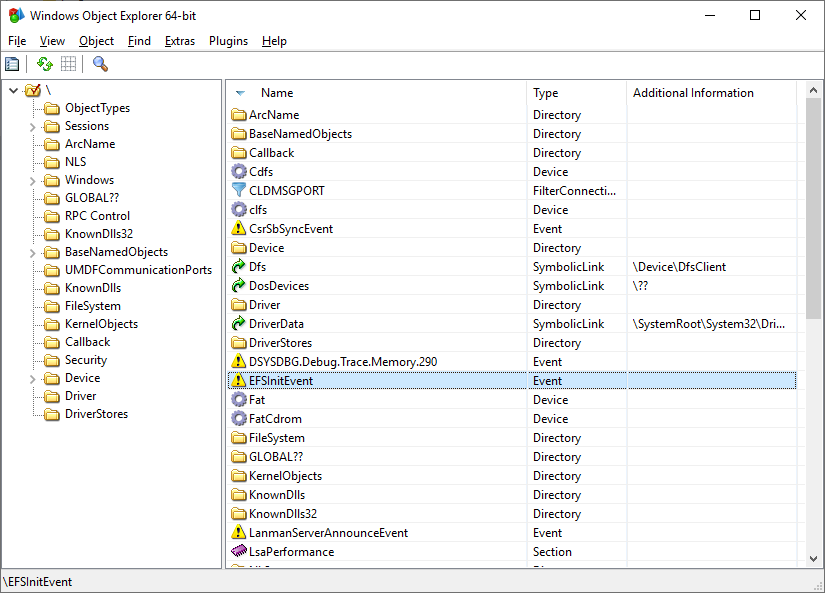WinObjEx64


Windows Object Explorer 64-bit

WinObjEx64 is an advanced utility that lets you explore the Windows Object Manager namespace. For certain object types, you can double-click on it or use the "Properties..." toolbar button to get more information, such as description, attributes, resource usage etc. WinObjEx64 let you view and edit object-related security information if you have required access rights.
System Requirements
WinObjEx64 does not require administrative privileges. However, administrative privileges are required to view much of the namespace and to edit object-related security information.
WinObjEx64 works only on the following x64 Windows: Windows 7, Windows 8, Windows 8.1, and Windows 10/11, including Server variants.
Features
View list
-
Explore all of Windows Object Manager namespace
-
Hierarchical objects tree
-
Symbolic links resolving
-
Version information for Section-type objects backed by an image file
-
Additional information for WindowStation-type objects
-
View objects details:
- Descriptions
- Flags
- Invalid attributes
- Memory pool type
- Object type-specific information
- Object-related structure memory dumps1:
ALPC_PORTCALLBACK_OBJECTDEVICE_OBJECTDRIVER_OBJECTDIRECTORY_OBJECTFLT_SERVER_PORT_OBJECTKEVENTKMUTANTKSEMAPHOREKTIMERKQUEUE (IoCompletion)OBJECT_SYMBOLIC_LINKOBJECT_TYPE
- Opened handles
- Statistics
- Supported access rights
- Process Trust label
- And more...
-
Display in dump sub-structures1:
ALPC_PORT_ATTRIBUTESDEVICE_MAPLDR_DATA_TABLE_ENTRYOBJECT_TYPE_INITIALIZERUNICODE_STRING- And many others
-
Edit object-related security information2
-
Detect driver object IRP modifications (via structure dump)1
-
Detect kernel object hooking (via structure dump)1
-
Search for objects by name and/or type
-
System information viewer
- Boot state and type
- Code Integrity options
- Mitigation flags
- Windows version and build
-
Loaded drivers list viewer
- Dump selected driver1
- Export driver list to CSV file
- Requires driver support (see "Driver Support" section).
- Administrator privileges may be required.
- Windows internals features unavailable on Wine/Wine-Staging.
- Administrator privileges required for some named pipes.
Driver support
WinObjEx64 supports two types of driver helpers:
-
Helper for read-only access to kernel memory:
- Default version uses the Kernel Local Debugging Driver (KLDBGDRV) from WinDbg.
- Requires:
- Windows booted in debug mode (
bcdedit -debug on)
- WinObjEx64 running with administrator privileges
- Custom helper driver versions do not require Windows debug mode.
- Multiple third-party drivers can be used as helpers, though only the WinDbg-type driver is included by default.
-
Helper to access object handles:
- WinObjEx64 (any variant) supports Process Explorer driver v1.5.2 for opening processes/threads.
- Enable by running both Process Explorer and WinObjEx64 with administrator privileges.
Note: All driver helpers require WinObjEx64 to run with administrative privileges.
Build
WinObjEx64 comes with full source code. To build from source, you need Microsoft Visual Studio 2015 or later.
Instructions
- Select Platform ToolSet first for the project in the solution you want to build (Project->Properties->General):
- v140 for Visual Studio 2015;
- v141 for Visual Studio 2017;
- v142 for Visual Studio 2019;
- v143 for Visual Studio 2022.
- For v140 and above, set Target Platform Version (Project->Properties->General):
- If v140, select 8.1;
- If v141 and above, select 10.
- Minimum required Windows SDK version: 8.1
- Recommended Windows SDK version: 10.0.19041 and above
What is new
Whats New in 2.0.0
Complete changelog
Support Our Work
If you enjoy using this software and would like to help the authors maintain and improve it, please consider supporting us with a donation. Your contribution fuels development, ensures updates, and keeps the project alive.
Cryptocurrency Donations:
BTC (Bitcoin): bc1qzkvtpa0053cagf35dqmpvv9k8hyrwl7krwdz84q39mcpy68y6tmqsju0g4
This is purely optional, thank you!~
Authors
(c) 2015 – 2026 WinObjEx64 Project, hfiref0x
Original WinObjEx (c) 2003 – 2005 Four-F

